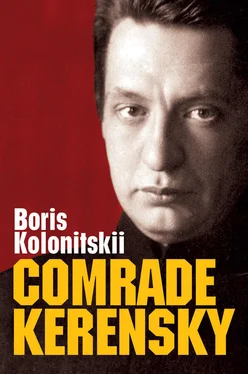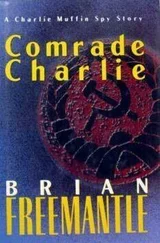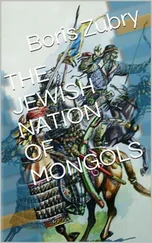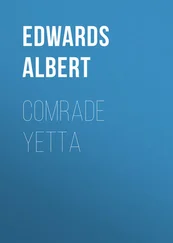Three days later Kerensky went even further, declaring that the state had been taken over ‘by an enemy power’ and a regime of occupation installed. This time it was the head of state himself who was accused of treason: ‘Ties of family and kinship take priority over the interests of the state…. The interests of the old regime are closer to people living abroad than to those inside Russia.’ Kerensky called for destruction of the regime, ‘this dreadful ulcer of the state’. On 16 December he repeated that compromise with the government was impossible and called on liberals to take decisive action; a professional lawyer, he argued that, under the circumstances, the duty of a citizen was not to obey the law. For that he was deprived of the floor. A speech he made on 15 February became particularly famous: Kerensky denounced ‘state anarchy’ and demanded ‘surgical methods’, calling for the physical removal of ‘violators of the law’. The orator declared that he shared the views of the party ‘which has openly inscribed on its banner the possibility of terror, the possibility of armed struggle with those representing the government, the party which has openly acknowledged the necessity of tyrannicides.’ In the forum of the Duma he acknowledged his support of the terrorist tactics of the illegal Socialist Revolutionary Party. He excoriated a ‘system of unaccountable despotism’ and demanded the destruction of a ‘medieval regime’. Responding to the chairman’s remark that such language was inadmissible, Kerensky went even further and made absolutely clear that he was ‘talking about what the citizen Brutus did in classical times.’ This was perceived as a public call for regicide. Kerensky’s friends were sure that after such statements he would be arrested, and they expressed their sympathy in advance. He himself did not believe that parliamentary immunity would save him and told friends that, if the Duma was dissolved, he would be arrested. 143It was a mood which may have influenced how Kerensky behaved in February 1917: he had burned his bridges, and only a swift replacement of the regime could keep him out of prison.
Kiriakov called his speech on 15 February ‘his first historic and by now manifestly revolutionary speech’. 144He was referring to the exceptional role Kerensky was to play in the coup. On the very eve of the February Revolution, Kerensky was receiving letters asking him for the text of his speeches which had been banned by the censorship, but of which thousands of typewritten and handwritten copies were disseminated throughout Russia. The speeches were distributed also in the form of leaflets, with many copies reaching the army. The Duma’s right-wingers expostulated that Kerensky was ‘Wilhelm’s aide’. Kerensky’s speeches did not go unnoticed in the imperial residence either: in a letter from the empress to the tsar, dated 24 February, she expresses a characteristic wish: ‘I hope that Duma man Kedrinsky [she means Kerensky] will be hung for his horrible speeches – it is necessary (wartime law) and it will be an example.’ 145However, some members of even the highest levels of society were not unappreciative of the speech: ‘Today … Kerensky said much that was true, and we all think as he does about many things,’ Rodzyanko’s wife remarked in a letter to – Princess Zinaida Yusupova. 146
Kerensky was the best-known and most gifted orator of the left, constantly transgressing the limits of what was permissible. For the radical intelligentsia, he was ‘their man in the Duma’. To many people in Petrograd his face would have been familiar because his portraits were printed in a variety of publications. In a time of crisis, to be recognizable is a political asset. The banning of his Duma speeches only added to his renown, and he found himself hailed as ‘the most popular person’ in town. 147Many people had no doubt that, in the coming crisis, Kerensky was destined to be centre stage. Indeed, at that time of unrest a number of deputations came to see him and demand that he ‘seize power’. The same demand was made in letters to him. 148There is nothing surprising about the fact that delegates from the Putilov factory came to Kerensky on 22 February (another group went to Nikolai Chkheidze, the leader of the Social Democratic group). They warned the ‘citizen deputy’ that the strike and lockout at their huge factory might have serious political consequences. 149
The following day Kerensky made the statement of the Putilov workers known in the State Duma, stressing how moderate their demands were. A Duma resolution was amended to include the demand ‘that all dismissed workers of the Putilov factory should be reinstated and operation of the plant immediately resumed.’ 150The resolution had no practical impact because the revolution had already begun that day, but the strikers may have felt heartened that the Duma’s demands and the speeches of the opposition deputies showed support for their actions. More and more enterprises went on strike, and the strikers headed for the city centre. Mobs ransacked food stores and political rallies began.
Kerensky’s speeches now stood him in good stead. His supporters wrote that, ‘long before the revolution, he had said in the Duma that a revolution was the only way of saving Russia from a state of anarchy which was being fomented from the throne. It was Kerensky who prompted the Russian Revolution to take the final step.’ 151
Kerensky’s subsequent influence was to be due largely to the decisive and effective action he took during the February Revolution. Already on 25 February, at what was to prove the last meeting of the State Duma, he called upon it to lead the movement and create a new government. In the evening, he made a speech at the Petrograd City Duma, protesting at the shooting of demonstrators and demanding establishment of ‘a responsible ministry’. He rejected compromise with the government. During these days Kerensky was present at a number of meetings with clandestine groups. One such was held on the evening of 26 February in his own apartment, to which he had invited activists of the socialist groups. Kerensky was to recall that he participated in setting up an information bureau to coordinate the actions of the socialist groups: the Trudoviks, Mensheviks, Bolsheviks, Interdistrict activists, Socialist Revolutionaries and People’s Socialists. Those assembled were unable, however, to come to any agreement because the rifts between them were just too great, but at least the exchange of views and the move to coordinate the protest movement was a big step forward. 152Even on that day Kerensky seems himself to have been unaware that the revolution had begun. 153
Kerensky tried unsuccessfully to persuade Rodzyanko to convene an official session of the Duma on 27 February. He and his allies wanted the Duma to take a tougher line, but the chairman was not to be persuaded: the official meeting was scheduled for 28 February. At an informal meeting of the Council of Elders in Rodzyanko’s office, however, it was agreed to hold a closed meeting of the Duma on 27 February at two in the afternoon. 154
Maintaining contact with the revolutionary underground, Kerensky was receiving information from illegal circles, and this bolstered his status in the eyes of his Duma colleagues who were desperate for up-to-the-minute intelligence on the popular movement. (He went out of his way on 27 February to show them how well informed he was, and may even have exaggerated.)
Kerensky’s role in those days at the end of February became a topic for the rumour mill. It was said that he and Chkheidze, hearing of unrest in the Reserve Battalion of the Volhynia Guards Regiment, had gone there on 26 February and fired up the soldiers, and that this had brought about the regiment’s mutiny the following day. 155In reality, Kerensky learned of the rebellion of the Volhynians early on 27 February. 156At about eight o’clock that morning Duma deputy Nikolai Nekrasov, a left-wing Constitutional Democrat and prominent Freemason, phoned him at home to say the Volhynians had mutinied and that the State Duma had been prorogued by royal decree. Kerensky hastened round to Nikolai Sokolov, who also lived near the Duma. After a brief conference with him and Alexander Galpern, he made for the Duma. 157Kerensky and other radical deputies tried to have the Duma continue in official session in defiance of the tsar’s decree and also urged that contact should be established between the Duma and the insurgents filling the streets of Petrograd. 158
Читать дальше









